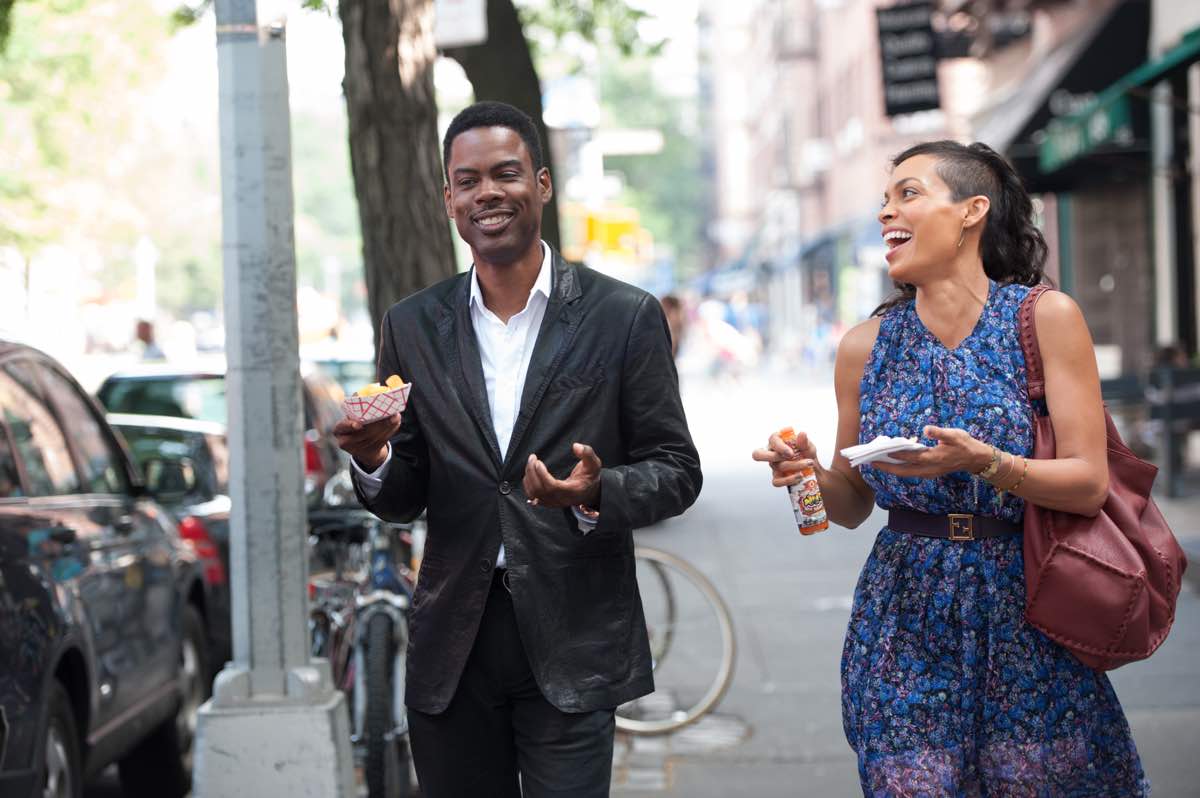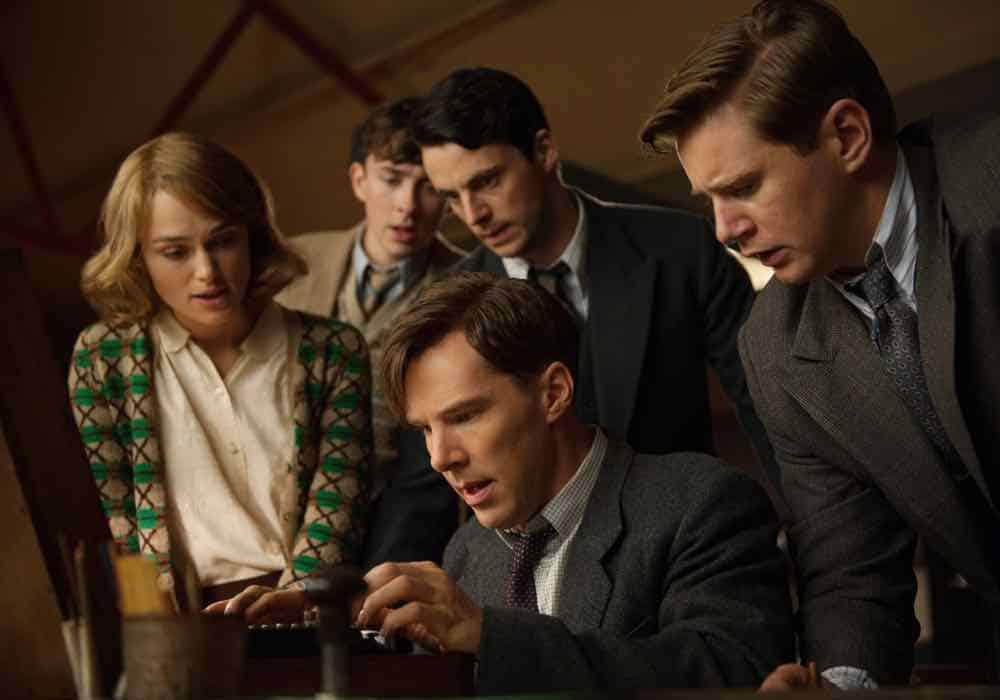
TF-01303
“It’s always good to make sure you’re never too good at one thing at a time,” mumbles Andre Allen (Chris Rock) to Chelsea Brown (Rosario Dawson), the New York Times reporter profiling him, upon learning that she dabbles in poetry, photography, and music. And yet, it could just as easily be applied to “Top Five,” the new comedy, from writer-director Chris Rock, that can’t quite decide what it wants to be.
It is part romantic comedy, part backstage comedy, part gross-out comedy, part addiction comedy, and part just wowing us with its cameos, which are as numerous, ubiquitous, and ultimately pointless, as those in the “Veronica Mars” movie. It’s okay at doing all of these things, but it’s never particularly good at doing any one of them. The romance is contrived; the sexual jokes rarely land; and the cameos seem more for show than for storytelling. That’s not to say that I didn’t laugh, quite a bit, or enjoy it, but it’s horribly predictable, and about as frequently tasteless as it is charming.
Rock plays a former comic actor who rose to fame for playing a cop in a bear suit in the fictional “Hammy” franchise. Eager to be taken seriously, he’s just starred in the historical biopic “Uprize,” as Dutty Boukman, the leader of the Haitian Slave Rebellion. Of course, Rock plays Andre’s career choice as satire: the posters of the film feature Andre making ridiculous grimaces and include quotes like “interesting!” which Allen explains is what critics say when they don’t have anything nice to say. Since he made the comedies that brought him his fame when he was drunk, he’s afraid that become sober might have destroyed his comedic sensibilities.
The film opens with Chelsea and Andre in a two-shot, walking on the streets of New York, talking about his life as a black comic actor, as part of the promotion for “Uprize.” If this weren’t already the film language of romance, perfected by Richard Linklater in the “Before…” films – and no doubt trickled down to Rock, possibly by way of Delpy’s “Two Days in New York” – it wouldn’t take much to guess that romance is in the air for these two. Dawson and Rock have great chemistry, to boot. Andre may be engaged, but since the woman is the wonderful Gabrielle Union (please, put her in more movies!) playing a famous ditz, she’s hardly a threat. The film take place over the 24 hours during which Chelsea follows and interviews Andre for her profile, with flashbacks to past episodes of Allen’s life. And it covers a lot of ground.
“Top Five” shines when dealing with Andre’s frustration with how people expect him to always be funny: it’s knowing about the way artists are asked to perform for the media circus. When he goes to record a blandly scripted promo for Sirius Radio, they insist that he make it sparkle with hilarity: he goes over-the-top with facetiousness, to prove a point, and they take it at face value, deciding that his “are you fucking kidding me” cut is precisely what they’re looking for.
The film has moments of warmth when we meet Andre’s lower-middle class family, a colourful group of people who love him to death, but love to give him shit, too — occasionally, it gets too crass, when his family, including a relative played by Tracy Morgan, speaks directly into lens, recalling Allen’s rise to fame. It’s also endearing and authentic when Andre and Chelsea bond over their addictions, sharing intimacies and war stories, even though a relapse late in the film gets treated flippantly.
But the film falls flat in its long digressions about adventurous sex. Andre’s anecdote about a raucous night in Texas with a pair of hookers who ultimately cried rape as retribution goes on and on without ever really getting laughs. Similarly, Chelsea’s explanation of how she should have known her boyfriend was gay gets crass and tasteless, as the details pile up, without actually being funny. Nothing is particularly explicit, but more is explicitly suggested than necessary, and for long enough to be unpleasant.
Then there’s the stuff that kind of works. I’m not sure I buy how much time Andre spends asking Chelsea personal questions, but I don’t think artists fall in love with their interviewers all that often, either. Hearing DMX sing a ballad in jail, with an expletive here and there is moderately amusing, but ultimately just another gratuitous cameo. Equally, the turnout for Andre’s bachelor party is a who’s who of comedy, including Jerry Seinfeld, but it’s more a reminder of Rock’s clout in the industry than useful story-wise: those scenes are more obsessed with the tits and ass in the background than in getting mileage out of its star cameos. Chelsea’s effect on Andre, helping to bolster his self-confidence, should be touching and almost is, but most of its impact is lost because it amounts to a series of obvious plot contrivances.
“Top Five” joins the ranks of “Birdman” and “Big Eyes” in its gross misunderstanding of how critics operate. Complain about us all you like, but at least complain about the embarrassing things that actually happen. These films suggest that our greatest offense is unrelenting vitriol, whereas the truth is willful ignorance or blatant stupidity are more common. The New York Times critic that has plagued Andre’s existence with his bad reviews, James Niesen, is an over-the-top caricature, but one that doesn’t actually resemble the journalism landscape. If the film had gotten him right, we critics would be the first to embrace the satire — Evelyn Waugh’s “Scoop,” a satire about the incompetence of journalists is most beloved by journalists.
Between “Dear White People,” “Beyond The Lights,” and “Top Five,” it’s been a good year for black cinema, especially for films that aren’t just about black suffering — “Top Five” even takes a gibe at this past trend. Like “Dear White People,” “Top Five” espouses theories about how certain mainstream films are actually, subliminally, about white fear of black people: Andre links the premiere of “Planet of the Apes” with Martin Luther King Jr.’s assassination — of course, it’s exaggerated for comedic effect. It would be easy to say this might become a tired trend, but we need more of this reclaiming, generally, when it comes to films that don’t own the fact that they’re about minorities; how many people realize “Dirty Dancing” is actually about a Jewess falling for a goy, and the havoc that wreaks?
Flawed and problematic as it is, “Top Five” does have its easy charms. Sadly, it’s all-black leads still make it niche in Hollywood terms. As the top seller at this year’s Toronto International Film Festival, raking in far more for distribution rights than is standard, it does give hope for the future. It may be the least worthwhile of this year’s entries into the new black cinema canon, but it’s further proof that there’s a real demand for this type of film.

